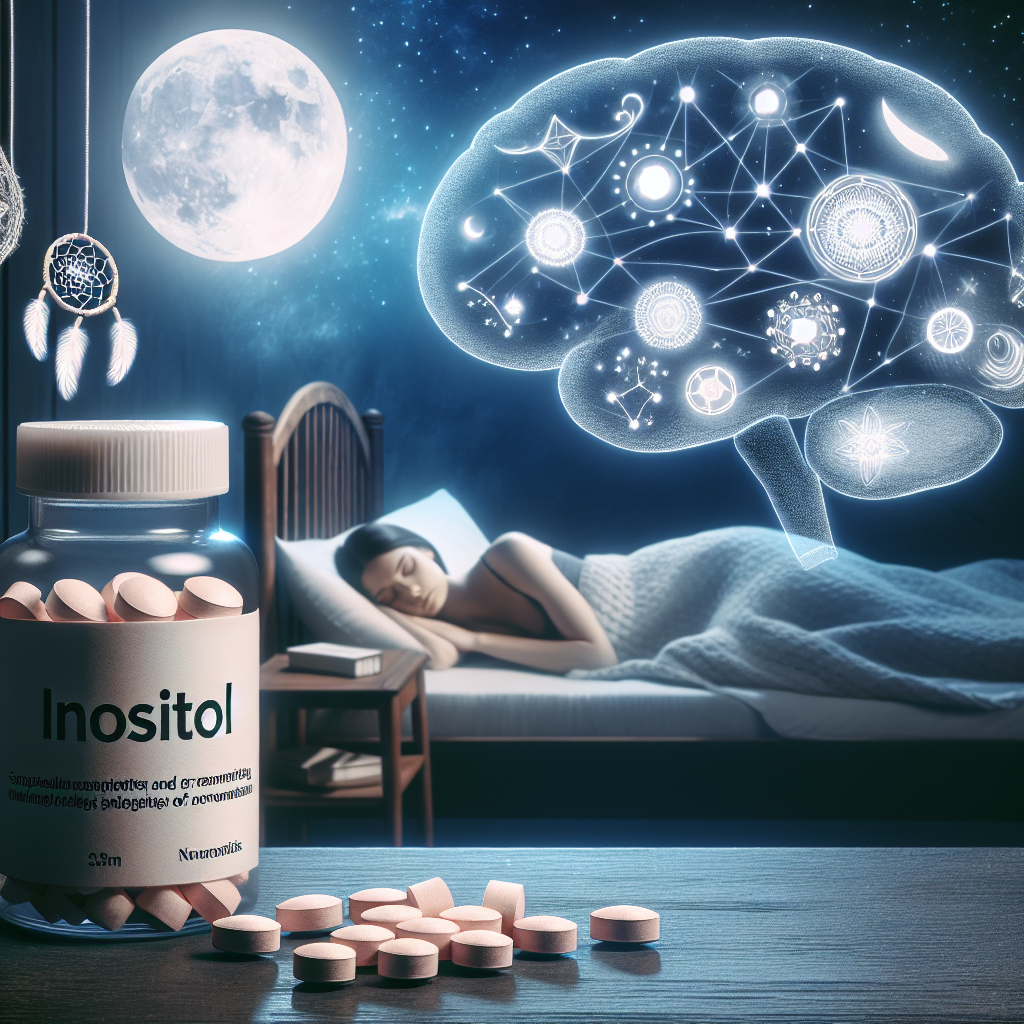Inositol: A Lesser-Known Supplement for Sleep and Anxiety

Exploring Inositol: A Natural Solution for Enhancing Sleep Quality
Inositol, a naturally occurring compound that plays a crucial role in the body’s cellular processes, has recently garnered attention for its potential benefits in improving sleep quality and reducing anxiety. While it may not be as widely recognized as other supplements, inositol’s impact on mental health and sleep patterns is supported by a growing body of research, making it a subject of interest for those seeking natural solutions to these common issues.
The human body produces inositol in small amounts, but it can also be found in various foods such as fruits, beans, grains, and nuts. Its primary role involves influencing insulin action and affecting neurotransmitter activity, which is crucial for regulating mood and cognitive function. This connection to neurotransmitter activity is where inositol’s potential benefits for sleep and anxiety come into play. Specifically, inositol has been shown to influence the action of serotonin, a neurotransmitter that plays a key role in sleep and mood regulation.
For individuals struggling with anxiety, inositol offers a glimmer of hope. Anxiety disorders often involve an imbalance in neurotransmitters, and by modulating the action of serotonin, inositol can help restore a sense of calm and balance. Several studies have explored this connection, with findings suggesting that inositol supplementation can significantly reduce anxiety symptoms in some individuals. This effect is particularly promising for those seeking alternatives to traditional pharmaceuticals, which can come with a range of side effects.
Transitioning from its anxiolytic properties, inositol’s influence on sleep is equally noteworthy. Poor sleep quality and insomnia are common issues that can have a profound impact on daily life, affecting everything from mood to cognitive function. The relationship between sleep and serotonin is well-documented, with serotonin playing a pivotal role in the sleep-wake cycle. By modulating serotonin levels, inositol can help regulate sleep patterns, potentially improving both the duration and quality of sleep. This is especially beneficial for those whose sleep disturbances are linked to anxiety or stress, as inositol addresses both issues simultaneously.
Moreover, inositol’s safety profile adds to its appeal as a supplement. It is generally well-tolerated, with few reported side effects, making it a viable option for long-term use. However, as with any supplement, it is essential to consult with a healthcare provider before starting inositol, particularly for individuals with pre-existing health conditions or those taking other medications.
In conclusion, inositol presents a compelling natural solution for enhancing sleep quality and reducing anxiety. Its role in modulating neurotransmitter activity, particularly serotonin, underpins its potential benefits in these areas. While further research is needed to fully understand its mechanisms and optimal dosages, the existing evidence suggests that inositol could be a valuable addition to the toolkit for managing sleep and anxiety issues. As awareness of inositol’s benefits grows, it may soon become a more prominent player in the realm of natural health supplements, offering a gentle yet effective approach to improving mental well-being and sleep.
The Role of Inositol in Managing Anxiety Without Prescription Medications

Inositol, a naturally occurring carbohydrate found in various forms within the body, has recently garnered attention for its potential benefits in managing anxiety and improving sleep quality without the need for prescription medications. This lesser-known supplement, often overshadowed by more popular alternatives, plays a crucial role in neurotransmitter signaling, particularly in relation to serotonin and dopamine, which are key players in mood regulation and sleep patterns. As the quest for natural remedies continues to gain momentum, inositol emerges as a promising candidate for those seeking to alleviate anxiety and enhance sleep through non-pharmacological means.
The human body produces inositol in small amounts, but it can also be ingested through certain foods or as a dietary supplement. It’s found in high concentrations in fruits, beans, grains, and nuts, making it accessible through a balanced diet. However, the therapeutic doses required to impact anxiety and sleep significantly exceed what one can typically consume from food alone, hence the growing interest in inositol supplements. These supplements, which are generally considered safe with minimal side effects, offer a concentrated dose of inositol, providing a direct pathway to its potential benefits.
Inositol’s mechanism of action in managing anxiety is thought to be linked to its influence on the brain’s serotonin system. Serotonin, a neurotransmitter often referred to as the “feel-good” chemical, plays a pivotal role in mood regulation. Inositol helps in making serotonin receptors more responsive, thereby potentially enhancing mood and reducing anxiety levels. This effect on serotonin also extends to its ability to improve sleep quality. By promoting a calm and relaxed state of mind, inositol can make it easier to fall asleep and stay asleep, addressing common issues such as insomnia and restless nights that often accompany anxiety disorders.
Research into inositol’s effectiveness in treating anxiety and sleep disorders is still in its early stages, but preliminary studies have shown promising results. For instance, some clinical trials have reported significant reductions in anxiety symptoms among participants taking inositol supplements, compared to those receiving a placebo. Similarly, anecdotal evidence from individuals who have incorporated inositol into their wellness routines suggests improvements in sleep quality, with many reporting a more restful night’s sleep and a decrease in the time it takes to fall asleep.
Despite these encouraging findings, it’s important to approach inositol supplementation with caution. While it is generally well-tolerated, it’s advisable to consult with a healthcare professional before adding inositol or any supplement to your regimen, especially if you are currently taking medication or have underlying health conditions. Dosage is another critical factor to consider, as too much inositol can lead to side effects such as nausea, fatigue, and digestive issues. A healthcare provider can help determine the appropriate dosage based on individual needs and health status.
In conclusion, inositol presents a compelling option for those exploring natural alternatives to manage anxiety and improve sleep. Its role in neurotransmitter signaling offers a unique approach to mood regulation and sleep enhancement, setting it apart from other supplements. As research continues to unfold, inositol’s potential as a safe and effective non-pharmacological intervention for anxiety and sleep disorders becomes increasingly evident. With its minimal side effects and natural origins, inositol stands out as a promising supplement for those seeking to improve their mental health and overall well-being.
Inositol: Understanding Its Impact on Sleep Patterns and Anxiety Relief
Inositol, a naturally occurring carbohydrate found in various forms within the body, has garnered attention for its potential benefits in managing sleep disorders and alleviating symptoms of anxiety. Despite its lesser-known status in the supplement world, inositol plays a crucial role in neurotransmitter signaling, particularly in relation to serotonin and dopamine, which are key players in mood regulation and sleep. This article delves into the science behind inositol, exploring how it influences sleep patterns and offers relief from anxiety, thereby shedding light on its potential as a beneficial supplement for those struggling with these issues.
The body’s ability to produce and utilize inositol is fundamental to several physiological processes, including insulin signal transduction, cytoskeleton assembly, and nerve guidance. However, its impact on the brain’s chemical messaging system is what makes inositol particularly interesting for individuals experiencing sleep and anxiety challenges. By modulating the action of neurotransmitters, inositol can help to balance mood and promote a sense of calm, which is essential for initiating and maintaining restful sleep.
Research into inositol’s effects on sleep has shown promising results. Studies suggest that supplementation can help to reduce the time it takes to fall asleep and improve the overall quality of sleep. This is particularly beneficial for those who suffer from insomnia or disrupted sleep patterns, as achieving deep, restorative sleep is crucial for physical and mental health. The exact mechanism by which inositol improves sleep is still under investigation, but it is believed that its role in neurotransmitter signaling plays a significant part.
In addition to its sleep-promoting properties, inositol has been studied for its potential in reducing symptoms of anxiety. Anxiety disorders are among the most common mental health conditions, affecting millions of people worldwide. The calming effect of inositol on the brain’s neurotransmitter activity can provide relief for those experiencing anxiety, making it a subject of interest for researchers and clinicians alike. Clinical trials have demonstrated that inositol supplementation can significantly decrease anxiety symptoms, including panic attacks, without the side effects commonly associated with pharmaceutical interventions.
The relationship between sleep and anxiety is well-documented, with poor sleep often exacerbating anxiety symptoms and vice versa. In this context, inositol’s dual action in improving sleep and reducing anxiety is particularly valuable. By addressing both issues simultaneously, inositol can help to break the cycle of sleep disturbances and heightened anxiety, leading to improved overall well-being.
Despite the promising evidence supporting inositol’s benefits, it is important to approach supplementation with caution. As with any supplement, individual responses can vary, and what works for one person may not work for another. Consulting with a healthcare professional before starting inositol supplementation is advisable, especially for those with pre-existing health conditions or who are taking other medications.
In conclusion, inositol offers a glimmer of hope for individuals struggling with sleep and anxiety issues. Its role in neurotransmitter signaling not only provides a scientific basis for its sleep-promoting and anxiolytic effects but also positions it as a potentially valuable supplement for enhancing mental health and well-being. As research continues to uncover the full extent of inositol’s benefits, it may well become a more prominent player in the supplement market, offering a natural alternative for those seeking relief from sleep and anxiety disorders.